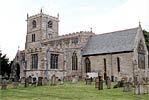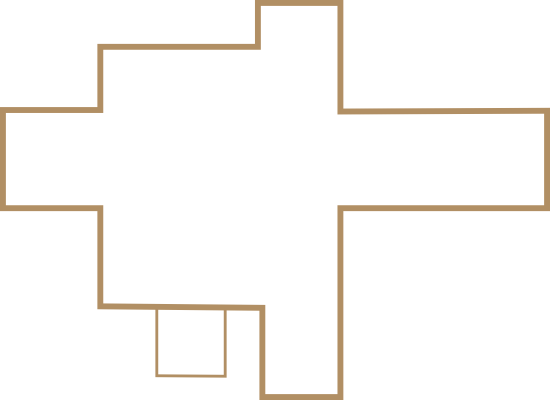For this church:    |
| |||||||||||||||||||||||||||||||||||||||||||||||||||||||||||||||||||||||||||||||||||||||||||||||||||||||||||||||||||||
Key to Glass |
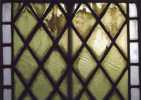 Older
glass with newer Older
glass with newersurrounds |
All the stained glass now in the church has been put in since the restorations by Ewan Christian in 1857-9 and 1872-5. Most of the clear glass is, however, of earlier date. The two windows of greatest interest are the east window and window in the north aisle, both of which were designed and made by Charles Kempe or his workshop. The clear glass consists of lozenge shaped tiles, 13cm x 7.5cm. Much of it dates from before the restorations and can be recognised as it is greenish and the surface is rough. This earlier glass is surrounded by small new glass tiles as specified by Christian.
1East window
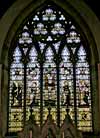 Caption Caption |
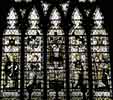 Caption Caption |
 St Laurence St Laurence |
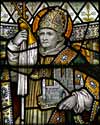 St Hugh of St Hugh ofLincoln |
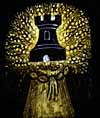 Tower-in-sheaf Tower-in-sheafsignature panel |
Early C14 (restored); five light lancet with geometrical tracery. The glass was inserted in 1908. The window was designed by Charles Kempe at the request of the widow of James Brand, a citizen of New York. Kempe originally designed a crucifixion; Mrs Brand requested a nativity but finally accepted the crucifixion which is what is seen today. It was made after the death of Charles Kempe by his nephew Walter Tower who took over the chairmanship of the company. This is confirmed by the wheat sheaf (Kempe’s signature) containing a tower (Walter Tower’s signature) in the bottom left sector of the window.
Left to right the panels depict:
| a. | St Laurence with a grid-iron and the palm leaf of a martyr, below a head bearing a banner with the words vulneratus est p[ropt]er inquietates nostra. | |||
 |
||||
| b. | St Mary the Virgin, above two angels; below a shield with the letter M | |||
 |
||||
| c. | Christ crucified; above IN RI; below shield with a red cross on a white ground | |||
 |
||||
| d. | St John; above two angels; below a shield with the letter I | |||
 |
||||
| e. | St Hugh of Lincoln, holding a model of his cathedral; immediately below a head bearing a banner with the words videte si est dolor sicut dolor meus. The dedication is below:
|
|||
 |
||||
| Above there are five small trefoil lights with IHS in the top centre light and in the others the wording Tu es rex gloriae Christe. | ||||
2,3,16
17,18These windows are in the chancel. They
are all C13 (restored); single plain lancets with deep splays. All have new
plain glass.
 |
 Detail Detail |
 Detail Detail |
Early C14 (restored) triple lancet with cusped heads and geometrical tracery. The glass was commissioned in 1883 by C A Dennistoun and made by Lavers Barraud and Westlake of Endell Street, Bloomsbury (signature in bottom of left light on the right hand column). It was completed in 1887. The window depicts scenes from the life of St John the Divine.
From left to right the panels depict:
| a. | St John in Patmos; above the heavenly vision | ||
 |
|||
| b. | St Peter and St John healing the sick; above St John with chalice and dragon | ||
 |
|||
| c. | St John in the market place at Ephesus; above St John in a cauldron | ||
The dedication is on a brass plate below the window and reads:
TO THE GLORY OF GOD AND IN LOVING MEMORY OF |
(There are memorials to the Dennistoun family in the churchyard.)
10![]() Window
at the base of the tower. (See below for other tower
windows.) C13 (restored), stained glass probably put in at the restoration
in 1874. The glass is in a formal pattern imitating medieval glass with a
dove descending.
Window
at the base of the tower. (See below for other tower
windows.) C13 (restored), stained glass probably put in at the restoration
in 1874. The glass is in a formal pattern imitating medieval glass with a
dove descending.
 |
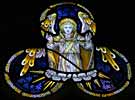 Angel Angel |
 John the Baptist John the Baptist |
 Christ Christ |
C14 (restored) double lancet. The glass is dated 1903 and was made by Charles Kempe; see his signature (the wheat sheaf) in the bottom left corner. Note also the typical pinnacled city, as in the east window also by Kempe.
The two panels depict Jesus (right) being baptised by John the Baptist (left). Below the dove above Jesus are the words Tu est filius meus in te placui. The dedication is in the bottom right sector:
In loving memory of William Wilson, who was born xxivth March |
Julia Brand also dedicated the east window to her parents, while there are other Rimingtons buried in the churchyard. The Holy city spreads across the top of both windows. There is an angel above.
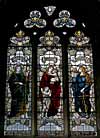 |
 Detail Detail |
 Faith, Charity Faith, Charity and Hope |
 Detail of Charity Detail of Charity |
C14 (restored), triple lancet. The glass was inserted in 1908 and is William Morris style.
Left to right the panels depict:
| a. | Faith, with a banner | ||
 |
|||
| b. | Charity, holding a child with an angel at her feet | ||
 |
|||
| c. | Hope, with an anchor and chain | ||
| There are grapes and scrolling vine leaves above each figure. | |||
There are three lights above, with a dove in the centre and two crowns below. Across the bottom of the window is the inscription:
THIS WINDOW IS DEDICATED TO THE GLORY OF GOD AND IN LOVING MEMORY OF |
There are memorials to the Hutton-Riddell family immediately outside the window.
 The
clerestory from the The
clerestory from theinterior |
 Seen
from the exterior Seen
from the exterior |
Clerestory
C15 (restored); on each side there are five triple lancets, pre-restoration plain glass.
Tower Windows
The tower has four stages, the windows are as follows:
Stage 1:On the south side: South, C13 (restored), single lancet, pre-restoration plain glass. On the west: see above
Stage 2:South, west and north, C13 (restored), single lancet, pre-restoration plain glass
Stage 3:South, west and north, C13 (restored) double lancets, pre-restoration plain glass
Stage 4:All windows louvred for bells.
Glass Recorded by Thoroton in 1677
None of this glass remains
East window of north aisle (window 15 above):
Azure Semy de Lis Or, and England
And England, with a File of three Labels, az
And England, quartering Az, Semy de Lis Or
The heraldic description of the arms suggests that this glass could have been put in as early as 1350. This coincides with a period when the prebendaries were resident in Norwell and may be linked with the history of the north chantry.
North window (probably window 14):
Chequer Or and Azure
East window of south aisle (window 5):
Arg. and a spread eagle Sable
In chancel:
England, and that with a File as before, and France and England quarterly, and Az. on a Fesse cotised Or, and three Libards’ heads Gules, LEE of Norwell.
Note the punning use of libards/leopards for Lee. Thoroton further notes that ‘these arms within a Border Gobone Erm. and Sab.’ were granted to Elizabeth Lee by Gilbert Dethick, Garter, on 6 October 1564.
Throsby (1796) also includes the information that there was painted glass in the chancel representing portions of scripture history.
With thanks to Tom Errington for help with understanding the glass.


